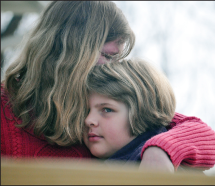
West Virginia churches build fourth home
 BY MELISSA LAUBER
BY MELISSA LAUBER
UMCONNECTION STAFF
Click here to view more pictures.
On a porch in Inwood, W. Va., Bishop John Schol handed a Bible to Kira Ruby to sustain her and so that she might become a living witness to its words. Along with the Bible, Ruby received a house, built by United Methodist churches in the Berkeley County cluster.
The Habitat for Humanity house will provide a new home for Ruby and her three children, who after her divorce are living in what some called "deplorable conditions," in a trailer.
"How do you say thank you for such gifts?" Ruby asked. "How do say thank you for hope and a home?"
The Habitat house is the fourth built by the cluster of 24 United Methodist churches, led by a core group of 32 people, who oversaw and participated in the 4,000 hours of work that created the home.
The house, reported Scott McDonald, the site construction chief, was the first Habitat House in West Virginia to be built as an Energy Star house, meeting construction standards for efficient and affordable energy that are more than 30 percent above building codes.
Claude Roberts, a member of Pikeside UMC, was one of the most devoted volunteers who contributed "sweat equity" to see the house rise. A retired principal, building something as substantive as a home for someone else had always been on his "bucket list" of things he'd like to do in his lifetime.
His church gave him the opportunity to make a difference.
This tactile experience of being able to put faith into action is one of the reasons the cluster began working with Habitat for Humanity in 1996, said the Rev. Ed Grove.
Over the years, United Methodists in West Virginia have become leaders in the building of these homes, and the work has drawn the churches into a partnership that has led to the strengthening of relationships with one another and with God, said Grove.
This is another expression of the potential and possibility that is realized when United Methodists come together, said the Rev. T.R. Chattin, superintendent of the Frederick District. "We can celebrate what many hands have done," she said.
In receiving the house, Ruby remembered the day she first found out about being chosen to receive the house. She was in a Books-a-Million store parking lot, looked up in the sky and saw a rainbow. It felt like a sign, she said.
In a sermon at Pikeside UMC, following the blessing of the new house, Schol preached on the rainbow and God's covenant with Noah. With this covenant, he said, God would become a builder, ceasing to tear things down and building something remarkable with the things that were at hand.
The bishop urged those present to follow God's example and become "creators and builders of life."
Toward this end, members of the Baltimore-Washington Conference are pledging to support a vision to build 500 units of permanent supportive housing by 2020.
"With hearts full of all the colors of God, we will bring hope, we will bring dignity and we will bring Christ to one another," Schol said. "Go and make Christ known and alive in our communities."

Login/Register to leave comment